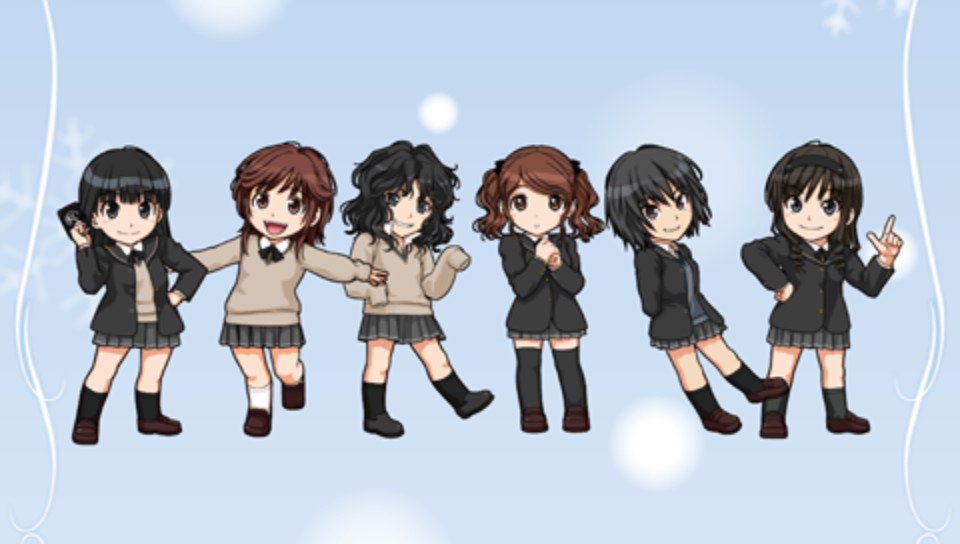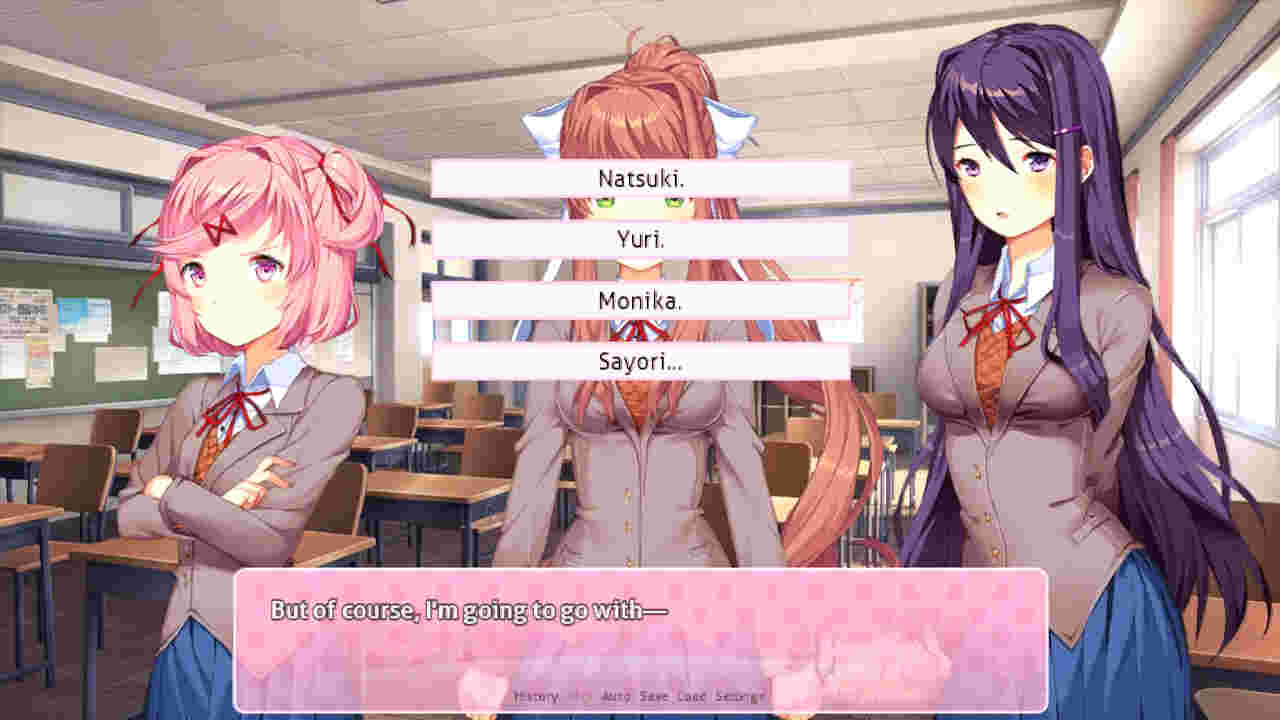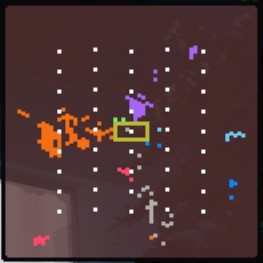03 September 2025
I recently started playing Doki Doki Literature Club (DDLC). It's a game I've had in my Steam library for years, but I've put it off for one reason or another. With my revived interest in Visual Novels this season, I figured why not give it a try. The genre tags for DDLC had been spoiled for me since shortly after its release, so sadly I wasn't really taken off guard there, but I was surprised by one particular choice that made my heart throb and my sweat run cold, and it's an element of dating games that I think are actually served better in traditional entries of the subgenre.

DDLC is not strictly a dating simulation, but it is a visual novel with dating elements. While the moment-to-moment gameplay varies quite a bit between dating sims and visual novels, the difference doesn't matter much here. For simplicity I'll just refer to all these as dating games. An important aspect of dating games is that they discourage the player from pursuing more than one girl at a time, usually with non-standard endings for players who choose to eschew this gamified social norm. I once read a guide to starting dating sims (iiotenki; dateemups.com, originally a cohost blog post) by Tom James who said the following:
[...S]ave states can enable you to have the perfect run and look like a flawless partner in the eyes of whoever you're wooing so you get the best endings each and every time. I say this as someone who often used to play like that myself: that sort of mentality can be ruinous to a game's intended ambience and narrative and rob successful runs of any real sense of fulfillment.
I think Tom James' advice above is useful from a
gameplay perspective but I would go even further. Whether or not you intend to
play a dating game with completion in mind, you should
always consider your first time a canonical telling of your story,
because it will magnify the weight you put into an undiscovered romance,
and it reflects the most real version of you in the
game: anxious, uncertain, sweating, hoping, and failing. And anyway,
you can't exactly strip your first time out of your permanent record.
I took that sentiment into my first dating game, Amagami, and had one of
the most profound experiences in my life. For the first time I
found a game where I didn't just consume a story, I co-wrote a
narrative that was completely unique to me.
My first run was full of uncertainty—I fumbled through first encounters
with the main cast, eventually setting my sights on Morishima, the upperclassman
with a quirky inner life. And I failed to secure her interest. In failure I sought
out a "next best" pick—a rebound—Sakurai Rihoko. I grew to care for Rihoko,
and now I wouldn't trade my experience with her for any other girl, but my story
with her was imperfect; did she know she wasn't my first choice? Was my character
living with regret about "what could have been?" I developed complicated feelings
about a story where the goal is just to have a date on Christmas.
After I "completed" the game I wanted to
see what else the game had to offer, but upon starting a New Game+,
I couldn't bear to pick anyone but Rihoko. My dialogue with Amagami
has been permanently altered by my experience with the game's systems and characters.
No amount of new saves or reset timelines can change that Rihoko was my first
kiss on that bitter Winter night.

In my first run of DDLC, just
like any other dating game, I picked a girl—Natsuki, the manga-reading
first-year student. I knew DDLC was a horror game, and I knew
things wouldn't be exactly as they seemed, but I wanted my first
route to reflect my pure feelings about the cast.
Despite accepting my choice, I couldn't help but notice
that Yuri was uniquely charming, and the narration and interactions with Sayori
made a strong case for her, but at every decision I chose Natsuki.
On the final day before the weekend, Sayori and Yuri both gave me the
cold shoulder. Sayori's mood soured so much that she left early.
The club bickered about how to delegate tasks
for the upcoming festival and then the question came...
"But of course, I'm going to go with—"
There was no "of course" about it for me. I wanted to spend time with
Natsuki, but I wished even more that I didn't have the choice at all. I
could see that my choice in that moment (really, my choice at every point
up to that moment) condemned the remaining girls to narrative oblivion.
The writing had convinced
me that I (Ruby) should care about Sayori at least as much as I
care about Natsuki, and that I (Ruby) was responsible for how
her life turned out. I did care... but I hung my head in shame and chose
Natsuki. Sayori would have to wait.
The game dished me plenty of guilt for my decision, and it worked
effectively to a point. DDLC teaches the player to save frequently at
important junctures. You might want to make a different
decision if you regret something you did, after all. Despite my promise to
live with my decisions, I diligently saved at each point
just in case I wanted to "try again". The weight of possibilities built
up behind me as I shuffled my feet towards the unknown.
What I didn't expect was that the game was done pushing that feeling on me.
Shortly after the
weekend with Natsuki, Sayori committed suicide and the game's genre swiftly changed.
Monika erased all of my saves and placed my avatar back into day one. I
had never been more relieved. All decisions had been taken out of my hands.
All responsibility was yielded to a singular narrative. I was no longer anxious,
afraid, or unsure—I knew I was in good hands. From that point on I just did
as I was told. I still attempted to date Natsuki, but after the game
railroaded me into a "relationship" with Yuri I stopped exercising any
free will at all. I wasn't in control, and nothing mattered. My anxiety
around balancing the complicated relationship
of four girls became a simple curiosity about what Monika wanted to express.
It's not that the game became "bad", but when you have no choice, there's
nothing to be afraid of.
Dating games aren't like action games or RPGs where
the drama is elevated beyond the mundane. They're about
trying to be a human. They're relatable, messy,
and awfully frightening. DDLC wiped my saves in a hasty attempt to make me
feel out of control, but instead it created an immense sense of stability
in an otherwise unstable genre. It doesn't matter where my save stands in Amagami, I
am eternally bonded to Rihoko for as long as I remember her.
Play dating games. Don't load your saves, don't game the system. Experience
messy relationships, break hearts, and write your own story worth telling. After
all, you can only tell it for the first time once.

If you're interested in reading about my messy experience with Amagami I wrote about it in my 2024 Reading Reports for September 8, 15, 22, 29, and October 6.